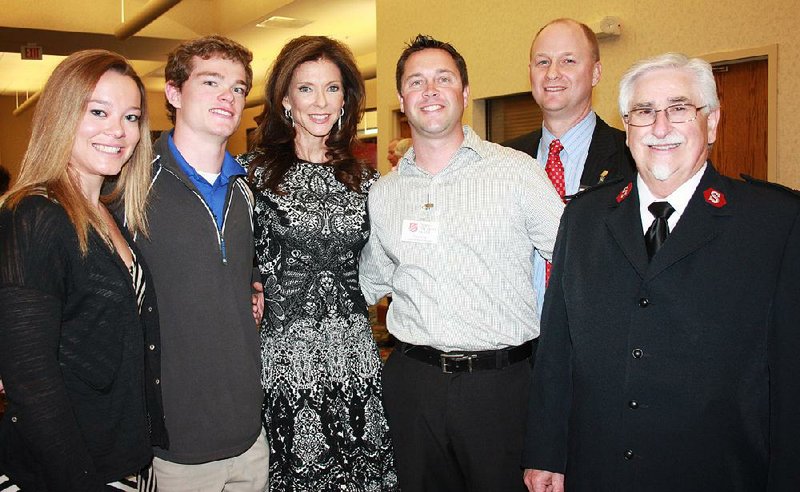Charlotte Jones Anderson said she thinks the NFL and its teams can do a better job of deciding punishment for off-the-field issues and also informing players of consequences to such issues.
Anderson was back in her hometown Monday as the first female speaker to address the Little Rock Touchdown Club in its 11-year history. Anderson, the daughter of Dallas Cowboys owner Jerry Jones and current executive vice president and chief brand officer for the team, was presented a proclamation for her accomplishments by Little Rock Mayor Mark Stodola, and spent almost 30 minutes discussing her family's journey since her father bought the Cowboys in 1989.
Afterward, she called domestic violence a "serious societal issue," and one that concerns the NFL and all of its teams.
The NFL has been under scrutiny for how it and the Baltimore Ravens handled discipline for running back Ray Rice, who was seen on video released by TMZ.com punching his now-wife at a New Jersey casino. Rice has been cut from the Ravens and suspended indefinitely by the NFL.
"Unfortunately, this is a very negative situation," Anderson said. "It is a serious issue and it is a serious societal issue that we have to figure out how to address. Not only address, how we evaluate and levy punishment, but how we allow our players to be better informed about why this is bad, and then how in turn help those who are victims of it."
Anderson, who has helped her dad and two brothers turn the Cowboys from a team that lost $1 million per week when they bought it to being named by Forbes magazine as the world's fifth-most valuable sports franchise, said the Rice case affects every NFL team.
"It's something that we all understand how serious the issues are, and we all know that we all have the responsibility to not only get our own house in order and how we address our players, but also help them understand what's wrong with those issues and hep those that suffer with it as well," she said.
"I always believe that in every challenge there's an opportunity to do something impactful. And this may be one of those."
Anderson, a 1984 graduate of Little Rock Central, is in her 25th season as an executive for the Cowboys after she quit a job in politics to join her dad.
As she told the story Monday, Anderson graduated from Stanford in 1988 and went to work for U.S. Rep. Tommy Robinson. It was then that her father called her to tell her his idea about buying the Cowboys.
Jones and Anderson went to Dallas to watch a game from Roger Staubach's suite, and she remembered Texas Stadium being half empty. At the time, the Cowboys were in the middle of a 3-13 season and a five-year playoff drought.
"That's how we got the opportunity to do it in the first place," she said. "Off we went."
It's been a long, and at times bumpy, ride since. But, Anderson touched on the family's view first using Texas Stadium, and now AT&T Stadium, as a revenue source outside of football games, and its involvement with the Salvation Army as some of the highlights.
But it was a garment question that got her to drop a budding politics career for football, when her dad called one day with an issue regarding the team's cheerleaders.
"Can you tell me what hot pants are?" she was asked.
She went to Dallas to help her dad, was asked to stay, and has never left. She helped the team balance its books by first moving training camp from California to Texas for more than a decade -- it alternates now -- and along the way she's forged her way in a male-dominated business by following a simple instruction from her dad.
"Whatever you do," he said, "don't tarnish the star."
Sports on 09/23/2014
